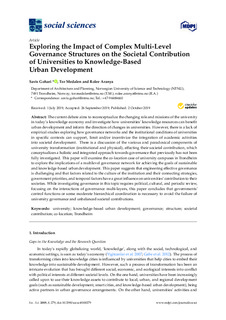| dc.contributor.author | Gohari, Savis | |
| dc.contributor.author | Medalen, Tor | |
| dc.contributor.author | Aranya, Rolee | |
| dc.date.accessioned | 2019-11-18T10:49:58Z | |
| dc.date.available | 2019-11-18T10:49:58Z | |
| dc.date.created | 2019-10-03T12:21:34Z | |
| dc.date.issued | 2019 | |
| dc.identifier.citation | Social Sciences. 2019, 8 (279), . | nb_NO |
| dc.identifier.issn | 2076-0760 | |
| dc.identifier.uri | http://hdl.handle.net/11250/2628968 | |
| dc.description.abstract | The current debate aims to reconceptualize the changing role and missions of the university in today’s knowledge economy and investigate how universities’ knowledge resources can benefit urban development and inform the direction of changes in universities. However, there is a lack of empirical studies exploring how governance networks and the institutional conditions of universities in specific contexts can support, limit and/or incentivize the integration of academic activities into societal development. There is a discussion of the various and paradoxical components of university transformation (institutional and physical), affecting their societal contribution, which conceptualizes a holistic and integrated approach towards governance that previously has not been fully investigated. This paper will examine the co-location case of university campuses in Trondheim to explore the implications of a multilevel governance network for achieving the goals of sustainable and knowledge-based urban development. This paper suggests that engineering effective governance is challenging and that factors related to the culture of the institution and their connecting strategies, government priorities, and temporal factors have a great influence on universities’ contribution to their societies. While investigating governance in this topic requires political, cultural, and periodic review, focusing on the interactions of governance multi-layers, this paper concludes that governments’ control functions or some moderate hierarchical coordination is necessary to avoid the failure of university governance and unbalanced societal contributions. | nb_NO |
| dc.language.iso | eng | nb_NO |
| dc.publisher | MDPI | nb_NO |
| dc.rights | Navngivelse 4.0 Internasjonal | * |
| dc.rights.uri | http://creativecommons.org/licenses/by/4.0/deed.no | * |
| dc.title | Exploring the Impact of Complex Multi-Level Governance Structures on the Societal Contribution of Universities to Knowledge-Based Urban Development | nb_NO |
| dc.type | Journal article | nb_NO |
| dc.type | Peer reviewed | nb_NO |
| dc.description.version | publishedVersion | nb_NO |
| dc.source.pagenumber | 25 | nb_NO |
| dc.source.volume | 8 | nb_NO |
| dc.source.journal | Social Sciences | nb_NO |
| dc.source.issue | 279 | nb_NO |
| dc.identifier.doi | 10.3390/socsci8100279 | |
| dc.identifier.cristin | 1733415 | |
| dc.description.localcode | © 2019 by the authors. Licensee MDPI, Basel, Switzerland. This article is an open access article distributed under the terms and conditions of the Creative Commons Attribution (CC BY) license (http://creativecommons.org/licenses/by/4.0/). | nb_NO |
| cristin.unitcode | 194,61,50,0 | |
| cristin.unitname | Institutt for arkitektur og planlegging | |
| cristin.ispublished | true | |
| cristin.fulltext | original | |
| cristin.qualitycode | 1 | |

